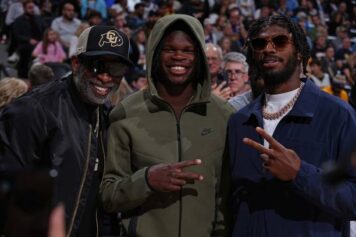When Empire debuted in January of 2015, I half joked to a classroom of Duke University students that I was thinking about teaching a comparative class that examined the Lee Daniels Fox series and Nashville, created by Callie Khouri, which launched on ABC in the fall of 2012.
The students looked at me incredulously at the thought of a class which, in the most reductive ways, would compare Hip-Hop and Country music, and Blackness with Whiteness.
Both series though, featured primary characters who built musical empires, in spite of a White all-boys network; Terrence Howards Lucious Lyons and his Empire Records and Connie Briscoes Rayna James and her Highway 65 Record. Additionally both series featured storylines that addressed the challenges of queer identities in genres largely premised on traditional notions of masculinity, and were fundamentally, about the recording industrys working class hustle.
I never offered such a class, as Empire descended into an urban cartoon (albeit, an entertaining one). Yet Nashville, which ended its six-year-run in July of 2018 after 124 episodes, continued to offer some of the most nuanced portraits of the contemporary American South.
NASHVILLE on CMT | 6 Seasons in 5 Minutes
Relive every episode of Nashville in under five minutes. Catch the final episodes on CMT starting June 7. SUBSCRIBE to CMT: http://at.cmt.com/uXvwn MORE NASHVILLE The Final Season Sneak Peek https://bit.ly/2HzZjLM Behind the Scenes of Season 6 https://bit.ly/2EYboEU Follow #NashvilleCMT: Twitter: @NashvilleCMT (http://twitter.com/NashvilleCMT) Instagram: @NashvilleCMT (http://instagram.com/NashvilleCMT) Facebook: @NashvilleCMT (http://facebook.com/NashvilleCMT) CMT.com: http://cmt.com/shows/nashville
What made me continue to love Nashville was its treatment of Deacon Claybourne (Charles Esten), a career long session musician, recovering alcoholic, and finally, a single father, who pound-for-pound, might have been one of the most compelling examples of American masculinity seen on mainstream television in recent years.
In the years before This Is Us, Greenleaf, Love is…, and Queen Sugar offered realistic, thoughtful, and dramatic portrayals of Black family life, the working class ethos of Nashville was appealing. And its not as if Nashville didnt attend to race. Musician Wyclef Jean had a recurring role as a record executive in the first season, as did veteran character actor Robert Wisdom (Ballers, The Wire), who had a role as a local politician and AA sponsor for Deacon Claybourne.
In later seasons American folk artist Rhiannon Giddens, who initially came to fame as part of the Carolina Chocolate Drops, had a recurring role, often serving as a moral center for some of the characters. In Nashvilles final season the show even managed to take on the subject of racial profiling and police brutality, via a young Black musician who was dating Claybournes teenage daughter.
For its first four seasons, the series followed tried-and-true melodramatic story arcs that largely focused on the antics of a young country music diva Juliette Barnes (Hayden Panettiere). In fact the series opened with the young diva and the aging diva Rayna James sparring over Claybournes services on their respective tours. It was Deacons relationship with his former flame Rayna, now married to the mayor of Nashville and the father of her two daughters (or so we thought) that was at the emotional center of Nashville — even more so after it is revealed in the season one finale that Deacon was the biological father of Raynas oldest daughter Maddie.
The revelation of Deacons biological tie to Maddie offered a portal into a sustained examination of the trinity of alcoholism, depression and toxic masculinity; Rayna never told Deacon about Maddie, in part, because of his inability to deal with those challenges earlier in their relationship.
Ironically, Deacon had been sober for thirteen years before finding out about Maddie. The joy of Nashville was to watch as this prototypical heterosexual American (White) male — what some might described as a real man — and all of the real fragility associated with a masculinity unraveling, descend into the very depths of struggle and failure.
NASHVILLE ON CMT | Character Catch-Up: Deacon Claybourne
Before we start Nashville’s new season on Jan 4, we’ve gotta remember where we’ve been. Charles Esten catches us up with Deacon.
There was a refreshing earnestness about Deacon, which initially took the form of his ability to mentor and counsel younger musicians, including the still closeted Will Lexington, who Deacon implored to protect himself (in all the ways that he should), without a hint of judgement, while the younger musician was looking for love in all the wrong places.
Deacons earnestness is also witnessed with the professionalism in which he went about his career as a session musician; it was his attention to his musical craft, that would later mirror his attentiveness to his flaws. And indeed Deacon was flawed — in a way rarely examined with equally flawed Black male characters — as audiences were encouraged to invest in Deacons literal recovery.
When Deacon seems to finally find victory — he marries Rayna during season four — even then, his past drunken outbursts threaten to derail his new family dynamic, when his daughter Maddie resists his heavy-handed parenting, and attempts to legally emancipate herself from her parents. Deacons previous episodes of anger and drunkenness were used to embolden her case.
Just as the series embraced a dramatic tension that allowed for a more cohesive story arc, ABC decided to cancel Nashville due to declining ratings, leaving the emancipation storyline unresolved. I gave some pause when CMT — the country music network — decided to pick up the series, and the fear that the move was initiated, in part, by a desire to reach younger audiences. Yet the the move to CMT and an unexpected tragedy in the storyline in season five created a context where Deacon would thrive.
Midway through season five, Rayna James unexpectedly dies in an automobile accident. You can only feel for Raynas family, particularly Deacon , who after spending almost a lifetime trying to make things right with love of his life, loses her. Dude cant catch a break.
Nashville Cast – Sanctuary ft. Charles Esten, Lennon & Maisy
Music video by Nashville Cast performing Sanctuary. (C) 2017 Lions Gate Television Inc. and ABC Studios under exclusive license to Big Machine Label Group, LLC. All Rights Reserved. http://vevo.ly/kBItea
On the brink of what could only be a final breakdown, Deacon recovers to take the reins of Raynas record company Highway 65, her legacy and as the father of two teenage daughters, including Daphne, who was Raynas ex-husbands biological daughter. Here Nashville offered a still rare view of a single father, who without the laugh tracks that have historically accompanied fatherhood on television, illuminated the challenges and joys of engaged fatherhood.
By the end of the series, Deacon had comes to terms with the abusive drunk father (played brilliantly by veteran actor Ronnie Cox), who was the source of so many of his demons, and shepharded his two teenage daughters into their own musical careers, finding a balance as both their father and advocate for their talents.
And in one more surprising turn, he finally emerged as an artist in his own right, while approaching middle-age, at a time when so many performers are being put out to pasture — perhaps mo more dramatically than contemporary Country music.
Deacon was a grown man and reminder that there are second and even third acts in lives that are complicated, frail and flawed. He will be missed.
***
Dr. Mark Anthony Neal is the James B. Duke Professor of African & African American Studies and Chair of the Department of African & African American Studies at Duke University where he offers courses on Black Masculinity, Popular Culture, and Digital Humanities, including signature courses on Michael Jackson & the Black Performance Tradition, and The History of Hip-Hop, which he co-teaches with Grammy Award Winning producer 9th Wonder (Patrick Douthit). He also co-directs the Duke Council on Race and Ethnicity (DCORE).



